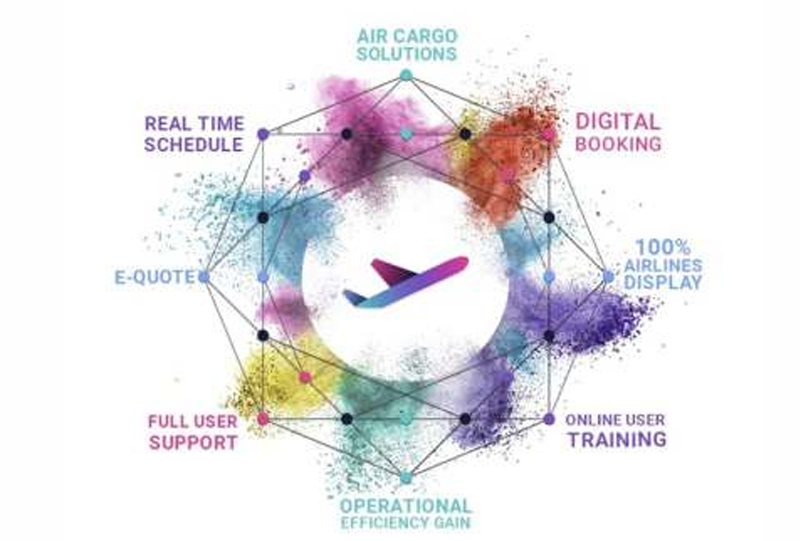CargoAi - Pioneering digital cargo solutions in the new normal
The digitalization campaign in the air cargo industry has been going on for many years. But it wasn’t until this Coronavirus pandemic came that all players in the sector and its supply chain, big or small, were convinced that it’s indeed time to upgrade the system and invest on smart technologies.
As more businesses adapt to the market dynamics of the new normal where contactless transactions have become the norm, more digital solutions are introduced and used in different industries like air cargo, which at the height of the crisis became an instant life-saver, hauling countless tons of vital medical supplies & equipment and other basic necessities across continents, despite the virus threat.
Seeing the need to link further the air cargo industry to the digital world, aviation expert and entrepreneur Matthieu Petot launched CargoAi in 2019 by assembling a team of experts in airfreight, technology, products, customer success and sales.
So, what does CargoAi do? CargoAi is a SaaS application offering air cargo digital solutions to freight forwarders, airlines and GSAs, allowing users to manage the entire air cargo booking process via a single tool.
Part of that pioneering team is Mathilde de Rocquigny, Chief Commercial Officer of CargoAI, one of few women who hold a top management position in the air freight male-dominated industry.
 Thriving in air cargo & tech industries
Thriving in air cargo & tech industries
With a dynamic and innovative team, de Rocquigny, a French national, continues to break the glass ceiling for women while thriving in air cargo and tech industries, fields both associated with men.
A “pure product of airlines and airports business” posted in different countries, de Rocquigny told Air Cargo Update she finds the industry a challenging environment but with lots to offer for those who persevere.
“I studied in Toulouse Business School, and Tech de Monterrey in Mexico,” shared de Rocquigny. “I joined Air France passenger business in 2000 with a French specific national service agreement, usually reserved for men. I jumped into the program as soon as they opened it for women. It gave me the unique opportunity to get a nice job and work abroad for a French company in Aviation. Thanks to this I spent four years working for Air France in Portugal.”
In 2004, she was introduced to airfreight when she joined the Air France Cargo HQ. Back then, very few women in the industry were given high positions and responsibilities. She was among the chosen few thanks to her technical expertise.
“Air cargo has always been a male environment, and it was even worse 20 years ago. When I joined Air France Cargo in 2004, I was in charge of the e-booking platform implementation. At that time there were not many young managers within cargo and not many females’ managers,” she recalled.
“I believe my expertise in managing technical projects helped me to convince people and to gain some respect from this traditional environment. Some years of experience in Japan and in airfreight, even more challenging situation, also helped to establish my position. I am glad to see, for the last years, many female leaders and CEO in Airlines and for Cargo business,” she added.
Now only on its second year, CargoAi is certainly new in the industry yet its impact should not be underestimated. Within a short period of time, the company has managed to forge partnerships with major players with a growing list of clients, convinced that its innovative ideas make a difference in the industry’s newfound importance in today’s global trade.
“We are new in the industry and the impact is already huge. We benefit from the current air cargo boom and it seems very relevant to talk about digitalization, specifically now. It is difficult to get capacity on cargo flights, everyone is trying to get the best process to book efficiently,” explained de Rocquigny.
“Customer services of both airlines and forwarders are overbooked with booking requests, quotes requests and we are coming at the right timing. We propose a solution that provides more visibility for airline capacity, that saves time for both airlines and forwarders and that is easy to implement,” she added.
While it’s been known for curbing a name in real time cargo capacity sales/purchase process, de Rocquigny said their platform offers a wide range of other functionalities.
“CargoAi offers a wide range of functionalities in the cargo capacity sales/purchase process. Forwarders can see all flights for cargo available for a route search. They can request for quotes, see the airlines contract rates and market rates. Our system enables to book and get a confirmation in minutes. We provide the track and trace function and we build dashboards for booking reports,” she said.
And through these extremely busy moments for the industry, the benefits are immediate noted the CargoAI CCO.
“Connecting to CargoAi will save time and money to airlines and forwarders, in addition to bringing more business. Our functionalities are developed to reduce unnecessary manual processes on both sides: managing an incoming booking, requesting a quote, checking for rates, checking for route proposal and availability on flights. All these time-consuming processes are now reduced to instants and seconds. This saved time can be re-allocated to decision-making process, focus on complicated shipments and business development.
“CargoAi allows airlines to reach more potential customers thanks to the route search functionality that displays all airlines schedules. Freight forwarders have now the best tool to choose the flights they need among a comprehensive list of airlines serving the requested route. It is a major change and a tangible benefit,” said de Rocquigny.
Dedicated to airfreight
While their digitalization expertise could be adopted in other industries, de Rocquigny said CargoAi is currently focused on anything but airfreight.
“We actually believe that there is a lot to do in air cargo digitalization and CargoAi already answers to the most important need: the sales/purchase of capacity thanks to its unique cargo capacity marketplace. There are many more processes to digitalize after this shipment booking management and we will certainly look at them in future. Our tech experts have great ambitions for our developments and capable to embrace such projects,” said de Rocquigny.
“We do not plan to expand these services to other industries as we specifically built a team of experts with both technology and airfreight profiles. We believe our experience in air cargo brings a lot. Our solution is specifically made for airfreight, by airfreight experts. Our knowledge in air cargo business is our advantage, we are dedicated to airfreight,” she added.
In today’s fast-moving and interconnected world, de Rocquigny said companies should opt for simple but smart tech solutions that offer the best benefits at optimized budget spend.
“Business and processes are moving so fast that I would recommend to avoid any long term/heavy structured projects. The time taken by these companies to build new systems is too long and not any more affordable in terms of time and budget. The most important is to go for reliable and quick implementation projects. At CargoAi, we talk in weeks of efforts, not in months. Our customers appreciate this,” she said.
CargoAi’s unique features enable an airline for instance to connect within just two to three weeks and have its flight schedules for cargo as quickly as possible.
“Cargo relies on light and flexible technologies. It means we are able to connect to an airline very easily and do that technical work in 2 to 3 weeks,” said de Rocquigny.
“In terms of functionalities, we also have a competitive advantage, our schedule module. CargoAi displays 100% of the flight schedules for cargo for any search for route and this is very powerful. None of our competitors has this module, and we created it! That is the power of having genius of tech on board and experiences airfreight people. We have created what everyone was looking for,” she noted.
IATA: Digitalization crucial to air cargo’s future
While the global aviation industry quickly embraced digitalization, the air cargo industry lagged behind, fully adopting the electronic Air Waybill (e-AWB) as the default contract of carriage for all air cargo shipments only on 1 January 2019, about a decade since the International Air Transport Association (IATA) pushed for its adoption.
This key industry milestone ushered air cargo into a new era where digital processes became the norm eliminating paper-based transactions, thus, improving efficiency and transparency.
The move turned out to be very crucial as the world faced its worst crisis, the Coronavirus pandemic, where air cargo played a very important role in keeping the flow of essential medical supplies and other goods flowing at every continent.
With all airlines grounded, belly-hold capacity sharply declined putting an unprecedented strain on air cargo to deliver essential medical supplies and other vital goods. In the early days of the pandemic, the industry managed to transport 1.5 million metric tons of medical and personal protective equipment across the world through some 46,000 special flights.
Innovative, agile and flexible, the industry managed to reconfigure some passenger planes into freighters to meet the rising demand for more air cargo haul.
With COVID vaccines now available to deal with the pandemic, air cargo’s role became even more important with its new mission of safely transporting the delicate vaccines in all corners of the world.
Throughout this process, air carriers and the supply chain have turned to digitalization and other smart technologies to accomplish what was described as the industry’s “mission of the century.” Specialized containers are used to safely transport the vaccines. Temperature-controlled facilities and coding systems are enhanced, and the list goes on.
And this seems to be just the beginning of the industry’s greater need for smart technologies to keep the world rolling in the new normal.











